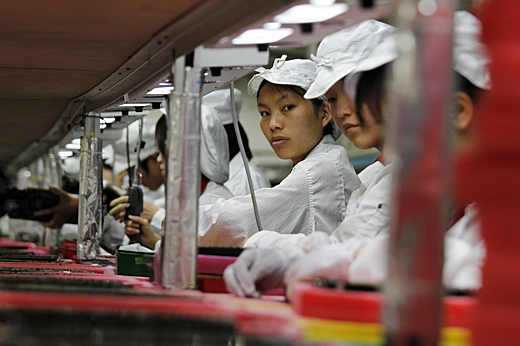 Image above: Chinese women on a production line at FoxConn, the manufacturter of iPhones and iPods. From (http://www.globalpost.com/dispatch/china-and-its-neighbors/100610/foxconn-suicides-why-higher-pay-wont-work).
By Staff on 30 July 2010 for CBC News -
(http://www.cbc.ca/money/story/2010/07/30/china-japan-gdp.html)
China has overtaken Japan to become the second-largest economy in the world, a senior Chinese official said Friday.
Image above: Chinese women on a production line at FoxConn, the manufacturter of iPhones and iPods. From (http://www.globalpost.com/dispatch/china-and-its-neighbors/100610/foxconn-suicides-why-higher-pay-wont-work).
By Staff on 30 July 2010 for CBC News -
(http://www.cbc.ca/money/story/2010/07/30/china-japan-gdp.html)
China has overtaken Japan to become the second-largest economy in the world, a senior Chinese official said Friday. "China, in fact, is now already the world's second-largest economy," China's currency regulator, Yi Gang, said in an interview posted on the agency's website.
Estimates from the IMF, World Bank and independent economists predict China will likely supplant the United States' economy as the world's largest by 2025.
While the country's massive manufacturing base makes that a likely bet to happen in the next decade, a lot hinges on what China decides to do with its undervalued currency.
China does not allow its currency to float on the open market, a practice that critics say undervalues it and allows it to artificially boost its exporting clout.
The Chinese economy has grown by an average of more than 10 per cent per year for much of the past decade. Rampant growth like that raises the spectre of inflation, which in turn eats into growth.
The country has also only begun to tackle complex labour and environmental issues as its economy develops, and it's unclear what impact those factors might have on its explosive economic growth.
Earlier this month, the International Energy Agency estimated that China had already supplanted the U.S. as the world's largest consumer of oil, a claim Beijing disputes.
Official data from China is always viewed with a healthy dose of skepticism, but China is generally believed to have passed Germany as the world's third-largest economy some time in 2007.
See also: Ea O Ka Aina: China passes U.S. in Energy Use 7/21/10
.
No comments :
Post a Comment